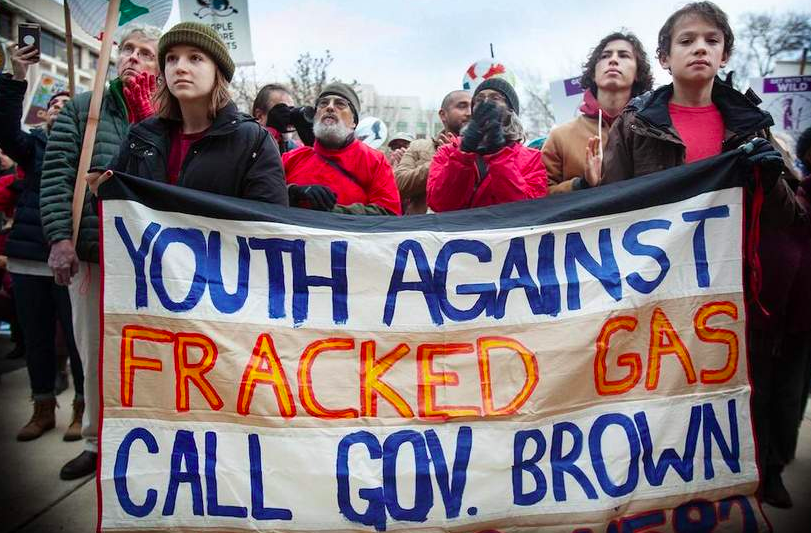
A protest in Salem, Oregon against the Jordan Cove LNG terminal and Pacific Connector pipeline Photo: Rick Rappaport
In Oregon, there is a fossil fuel infrastructure project undergoing permitting and approval that is stirring up controversy, putting the newly re-elected Governor of the state, Kate Brown, on the spot over her campaign promise to tackle the issue of climate change. The Jordan Cove liquefied natural gas (LNG) export terminal and its Pacific Connector Gas pipeline would transport fracked natural gas from Colorado all the way to Oregon’s coast, where it would be super-cooled into liquid form and loaded on ships in the terminal bound for international markets. A huge crowd of protesters attended a state hearing on the project expressed grave concerns about the large quantities of soil that would need to be displaced in order to install the proposed three-foot wide pipeline, spanning 229 miles, 78 wetlands, and 485 waterways across the state through four Oregon Counties.
The $10 billion project has hit many roadblocks in the 12 years since it was first proposed during the Bush Administration when LNG terminals were permitted readily.
- In 2016, the Federal Energy Regulatory Commission (FERC) denied a permit;
- Key politicians including U.S.Senator Jeff Merkley have come out against it;
- In late 2018, the Oregon Department of Energy recommended against the export facility going forward as proposed; and
- Last week, a county judge in Oregon reversed a decision to extend a permit for the pipeline.
Interestingly, ranchers, environmental groups, and Native American tribes are opposed to the project, while labor unions favor it because they claim it will provide 1400 jobs, as well as providing millions in tax revenues to the counties it crosses. Several permits are pending, including the Oregon Department of State Lands permitting process that ends on Feb. 3., and at the federal level, the Federal Energy Regulatory Commission’s Draft Environmental Impact Statement which is expected to become public as soon as February 15th.
Why This Matters: The project has friends in high places both at the state and the federal level, and its owners gave generously to various political campaigns in order to smooth the way for the pipeline despite public opposition. According to Ecowatch and the DeSmog Blog, the CEO of the Canadian company that owns the project met with President Trump and Gary Cohn, who then led President Trump’s National Economic Council. Cohn announced soon afterward, the “first thing we’re going to do is we’re going to permit an LNG export facility in the Northwest.” So it could be that the federal permit approval process is… well, rigged. Governor Brown, what say you? The Oregon Department of State Lands could make a decision on the project as soon as early March.
January 29, 2019 » climate change, Colorado, FERC, fracking, Governor Kate Brown, LNG, Oregon, pipeline, President Trump, wetlands

